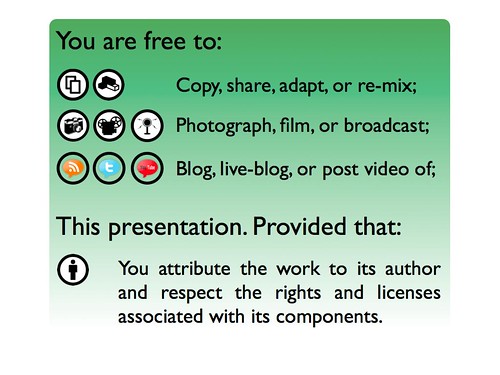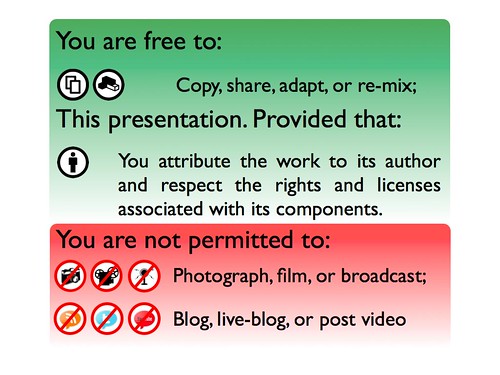A couple of weeks ago there was a significant fracas over Daniel MacArthur‘s tweeting from a Cold Spring Harbour Laboratory meeting. This was followed in pretty quick succession by an article in Nature discussing the problems that could be caused when the details of presentations no longer stop at the walls of the conference room and all of these led to a discussion (see also friendfeed discussions) about how to make it clear whether you are happy or not with your presentation being photographed, videoed, or live blogged. A couple of suggestions were made for logos or icons that might be used.
I thought it might be helpful rather than a single logo to have a panel that allows the presenter to permit some activities but not others and put together a couple of mockups.


I’ve also uploaded a PowerPoint file with the two of these as slides to Slideshare which should enable you to download, modify, and extract the images as you wish. In both cases they are listed as having CC-BY licences but feel free to use them without any attribution to me.
In some of the Friendfeed conversations there are some good comments about how best to represent and suggestions on possible improvements. In particular Anders Norgaard suggests a slightly more friendly “please don’t” rather than my “do not”. Entirely up to you, but I just wanted to get these out. At the moment these are really just to prompt discussion but if you find them useful then please re-post modified versions for others to use.
[Ed. The social media icons are from Chris Ross and are by default under a GPL license. I have a request in to make them available to the Public Domain or as CC-BY at least for re-use. And yes I should have picked this up before.]

How about taking regular notes? Does that need to be covered? It could be quite a fine line between note-taking, writing a summary for colleagues, and live blogging.
I’m still taken aback by the fact that people actually blog about the presentations they are watching. I can’t imagine that happening at any of the conferences I’ve been to. In fact, half the people usually seem to be writing unrelated e-mails, and the other half asleep. (It will be different at SAS2009, I’m sure!)
Perhaps I should try – it might actually encourage me to take notes during the talk if they are in the form of a blog rather than the more traditional form!
One final icon. “You are not permitted to: write e-mails during this presentation!”
How about taking regular notes? Does that need to be covered? It could be quite a fine line between note-taking, writing a summary for colleagues, and live blogging.
I’m still taken aback by the fact that people actually blog about the presentations they are watching. I can’t imagine that happening at any of the conferences I’ve been to. In fact, half the people usually seem to be writing unrelated e-mails, and the other half asleep. (It will be different at SAS2009, I’m sure!)
Perhaps I should try – it might actually encourage me to take notes during the talk if they are in the form of a blog rather than the more traditional form!
One final icon. “You are not permitted to: write e-mails during this presentation!”
Great idea :-) I tried to download the slides from Slideshare but was refused/hit a problem. Can you fire them to me by email? thanks
Great idea :-) I tried to download the slides from Slideshare but was refused/hit a problem. Can you fire them to me by email? thanks
At #LOTF09 there were three screens – one was running the tweets in realtime – so the audience could see what they were saying about the speaker(s). Since I was on the panel I couldn’t see this and didn’t know about it till afterwards. I enjoyed the experience but I can imagine people who wouldn’t.
The world is changing
At #LOTF09 there were three screens – one was running the tweets in realtime – so the audience could see what they were saying about the speaker(s). Since I was on the panel I couldn’t see this and didn’t know about it till afterwards. I enjoyed the experience but I can imagine people who wouldn’t.
The world is changing
My recent experiences of tweeting from a conference are here: http://wishfulthinkinginmedicaleducation.blogspot.com/2009/06/tweeting-from-conference.html
I’m presenting at a medical education conference later this month and I am going to ask for people to tweet!
Thanks
Anne Marie
My recent experiences of tweeting from a conference are here: http://wishfulthinkinginmedicaleducation.blogspot.com/2009/06/tweeting-from-conference.html
I’m presenting at a medical education conference later this month and I am going to ask for people to tweet!
Thanks
Anne Marie
How is “blogging” different from “adapting” or “remixing”? Isn’t a live blog of a presentation in some way an adaptation of it?
How is “blogging” different from “adapting” or “remixing”? Isn’t a live blog of a presentation in some way an adaptation of it?
Leslie, it isn’t different in practice or in a legal sense but people feel differently about it, especially if it is “live” or “broadcast”. My object was to be explicit about what the presenters _wishes_ are. You can’t do much more than that in practice.
Ann Marie, sounds good – will try to follow when it happens!
Jonathan, it varies from discipline to discipline but in tech and IT areas tweeting and liveblogging are very common. Also becoming common in “industrial” biology areas and bioinformatics. Less so in chemistry and physics but there are pockets there. To turn it around – if you’re taking notes, why not maximise your and other people’s benefit out of them by making them public?
Leslie, it isn’t different in practice or in a legal sense but people feel differently about it, especially if it is “live” or “broadcast”. My object was to be explicit about what the presenters _wishes_ are. You can’t do much more than that in practice.
Ann Marie, sounds good – will try to follow when it happens!
Jonathan, it varies from discipline to discipline but in tech and IT areas tweeting and liveblogging are very common. Also becoming common in “industrial” biology areas and bioinformatics. Less so in chemistry and physics but there are pockets there. To turn it around – if you’re taking notes, why not maximise your and other people’s benefit out of them by making them public?